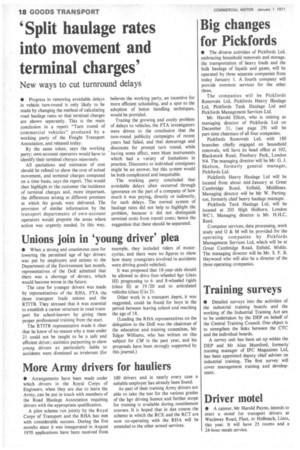'Split haulage rates into movement and
Page 20

If you've noticed an error in this article please click here to report it so we can fix it.
terminal charges'•
New ways to cut turnround delays
• Progress in removing avoidable delays in vehicle turn-round is only likely to be made by changing the method of calculating road haulage rates so that terminal charges are shown separately. This is the main conclusion in a report "Turn round of commercial vehicles" produced by a working party of the Freight Transport Association, and released today.
By the same token, says the working party; own-account operators would have to identify'their terminal charges separately.
All quotations and estimates of cost should be refined to show the cost of actual movement, and terminal charges computed on a time basis, says the report. This would then highlight to the customer the incidence of terminal charges and, more important, the differences arising at different premises at which his goods were delivered. The provision of similar information by the transport departments of own-account operators would pinpoint the areas where action was urgently needed. In this way, believes the working party, an incentive for more efficient scheduling, and a spur to the adoption of better handling techniques, would be provided.
Tracing the growing and costly problem of delays to vehicles, the FTA investigators were driven to the conclusion that the turn-round publicity campaigns of recent years had failed, and that demurrage and discounts for prompt turn round, while having some effect, were blunt instruments which had a variety of limitations in practice. Discounts to individual consignees might be an answer, but this system would be both complicated and inequitable.
The working party concluded that avoidable delays often occurred through ignorance on the part of a company of how much it was paying, directly or indirectly, for such delays. The normal system of haulage rates did not help to highlight the problem, because it did not distinguish terminal costs from transit costs; hence the suggestion that these should be separated.




















































































